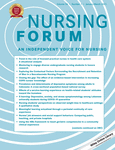Effects of a service-learning experience on health-related students' attitudes toward the homeless
Abstract
Objectives
A community engagement service-learning experience was planned to provide health services for the homeless during a local 1-day event. The objectives were to (a) determine the feasibility of a service-learning experience, and to (b) examine the effects on students’ attitudes toward persons experiencing homelessness.
Methods
A quasi-experimental, institutional review board approved study, including health-related students enrolled in a local university or community college, was planned. The attitudes toward the homeless survey was administered before and after participation in the service-learning experience. Qualitative data were through student reflections of the experience.
Results
Participants (n = 106) completed a pre and post questionnaire and a self-reflection. A statistically significant t(26) = −2.2, p = .04 change in attitudes toward the homeless were found. Three themes were revealed from the reflections: inherent bias, individualized care, and the societal context of people experiencing homelessness.
Conclusion
Both quantitative and qualitative findings may help students reflect on preconceived stereotypes; therefore, affecting their attitudes toward the homelessness.
CONFLICT OF INTERESTS
The authors declare that there are no conflict of interests.




